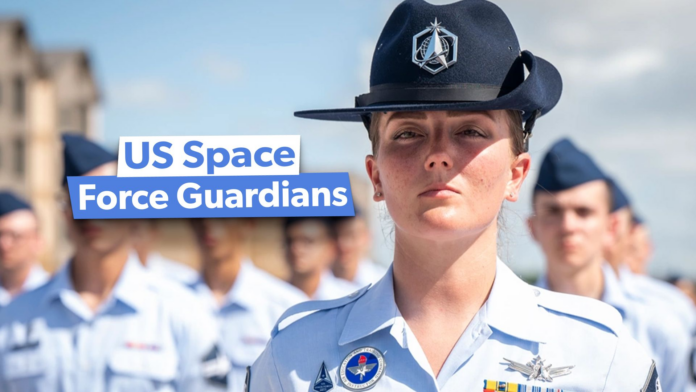STARCOM is a central unit within the organization of the US Space Force (USSF). They provide training and education that shapes new Guardians, fresh from US Air Force basic training, into fighters fit for the unique battlefield of outer space. This command has a comprehensive approach to readiness that leverages the wealth of experience and knowledge gained from decades of operations in space. While the Space Force may be new, their team and their mission is far from it.
Training and development
First Consolidated Officer Training Course for Guardians is a ground-up, tailor-made program crafted by STARCOM to mold officers into Guardians and leaders that are needed to win the battle for space. Located at Peterson Air Force Base (AFB), OTC introduces an innovative training regimen tailored specifically for Space Force officers.
Photo: US Space Force
The inception of a dedicated training course marks a significant step in independence for the Space Force away from the infrastructure and paradigm of the US Air Force. The intent of the OTC curriculum is to imbue upon the officer corps of the USSF a deep understanding of space as a warfighting domain, focusing on the technical and strategic aspects unique to operations on the final frontier.
As the Space Force matures into a fully independent service branch, the evolution of its training protocols will be refined to ensure that officers are masters of both leadership and tactics. The integration of real-time data from space operations into classroom settings provides officers with a unique perspective on the challenges they will face (Ender’s Game anyone?).
Operational readiness
As a relatively small force with only 9,400 total Guardians in the ranks of the Space Force, the role of every individual is felt more keenly as it affects the broader readiness of the organization. As a recently formed division of the US armed forces, established in 2019, USSF is still reliant on the USAF for basic training of inductees. A Space Force Boot Camp would establish a distinct indoctrination program tailored to the role of a Guardian. This move would streamline and refine the early training phases for new recruits which would reduce the total training time and improve the quality of training received.
The challenge of operations in the domain in space is very unique and the demands of service in the Space Force are unlike any other service branch. An organically managed basic school would enable continuous refinement of curricula to incorporate space-specific challenges like satellite operations and orbital mechanics that Guardians need to understand as a function of their duties, thereby enhancing the readiness of the USSF as a whole.
Rubber meets the road at Space Flag
Exercises play a crucial role in translating training into operational success. The Space Flag exercise is a key component of the USSF readiness strategy:
“Space Flag teaches integrated mission planning, but it’s more focused on how those space forces come together into an integrated sortie to meet combatant commanders’ intent,” Lt. Col. Scott Nakatani, commander of the 392nd Combat Training Squadron, told Air & Space Forces Magazine. “And all of that’s directly in line with our direct marching orders, our new direction from the secretary, from the CSO.”
Photo: US Space Force
High quality training exercises provide Guardians with scenario-based drills that mirror potential space conflicts. Simulating real-world conditions in a high-fidelity environment is the most effective method of developing the technical and leadership skills required for mission success. As with any military branch, exercises are fundamental to the training cycle of both new and senior members.
The fresh Guardians gain experience and knowledge from practical experience as well as the mentorship of their seniors. Meanwhile the leaders and commanders have opportunities to evaluate and refine tactics, strategic concepts or technology under conditions that as close to reality as possible. The feedback and data from exercises like Space Flag is used to continuously improve training, tactics and equipment so that the Space Force remains one-step ahead of emerging space threats.
Photo: US Space Force
Chief Master Sergeant of the Space Force John F. Bentivegna, said he was “blown away” by the start of Space Flag 25-1: “56 squadrons, 11 Deltas, 85 operational planners, 31 tactical planners, 111 ops crew members, 373 participants, all focused on the domain and the fight and integration and lessons learned,” Bentivegna told Air & Space Forces Magazine. “That’s exactly the environment our Guardians deserve.”
Related US Space Force: How Are Satellites Used In Defense? Satellites are becoming an ever-critical part of the way the United States fights and dominates its opponents.
STARCOM’s home
STARCOM is housed at Patrick Space Force Base (SFB) in Florida, located between Satellite Beach and Cocoa Beach in Brevard County, Florida. It is home to Space Launch Delta 45 (SLD 45), which controls Cape Canaveral Space Force Station (CCSFS). Patrick SFB is also home to the Air Force Technical Applications Center (AFTAC) which is a surveillance organization tasked with monitoring nuclear treaties through the use of hydroacoustic, seismic and satellite-detection systems. STARCOM was activated as the Space Force’s third field command in 2021 with the new role of developing and fielding forces to fight and win in the space domain.
Despite being a newly formed command within a newly established service branch, the team at STACOM is working hard to institute a comprehensive plan for training and readiness that will prepare the next generation of warfighters to dominate the domain of space. The unique operational demands and mission sets of a Guardian in the USSF necessitate a mature and forward-looking strategy to develop the technical, tactical and leadership skills needed to fight and win in the battles of tomorrow.



